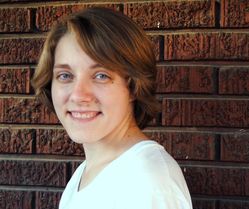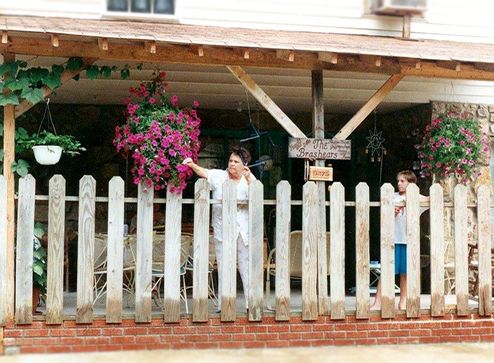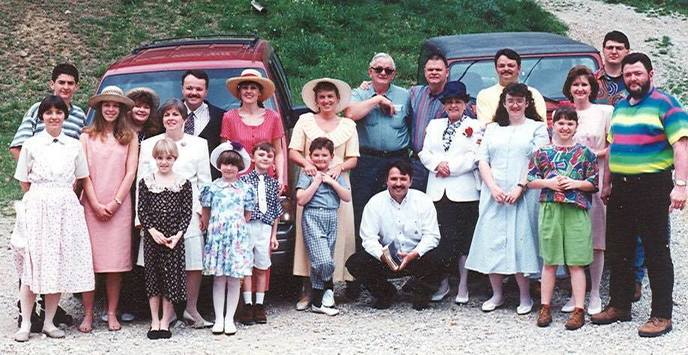|
By Sadie Lawrence Where We Are From
By Sadie Lawrence We are from the dirt A small seed That has grown From the earth To a magnificent, towering oak We are from the ashes A fiery phoenix That has risen From the remains To emerge burning and powerful We are from the clouds A thundering storm That has formed From electrical charge To rain down strength and beauty We are from the ground A pounding river That has washed away doubts From the bank of our past To flow clean and clear on the path to the future *** It is my belief that we are all made from the same stuff. We are formed from the stardust leftover from when the universe erupted into existence. And we are all humans. We all want the best for ourselves and our children, our future. Since I joined KSEC last semester, I have felt increasingly empowered to make my small part of the universe heard. I organized an art gallery last semester revolving around the theme “Problems and Solutions in the Community.” I also helped plan a Determination Rally with the Young Earth Activists Club at my high school advocating against the pulling out of the Paris Climate Agreement. And now I am working with KSEC’s Political Working Group to plan the Rise Up Kentucky Rally on February 12th in Frankfort. This rally is all about making youth’s voices heard. We may be from fewer years, but that doesn’t mean we don’t care about the looming future. In fact, I’ve heard from many of my peers and from personal experience that the future gives many young people a lot of anxiety. We’re not sure what to do next. We ask which stepping stone will be the most stable and sturdy? What will happen if we choose the wrong one? When I am unsure about the next step to take, it’s easy to shut down and try to take comfort in knowing someone else could always fill my place. There are always other people with more passion and more knowledge. “It won’t matter what I do anyway. I’m just one person in a world of 7 billion.” But the thing is, every single person counts. Every single person’s stardust is needed to make up the universe. Without it, the world we live in would be very different. Right now, this generation and those to come are being threatened by a changing climate, air and water pollution, and an economy that extracts our wealth and our health. For me, KSEC gave me a way to combat that anxiety and gave me actions I can take to address the problems at hand. I have ways to contribute and ways to show people that I am not apathetic about my future. This is one of the goals of the upcoming Rise Up Kentucky Rally: to learn new tactics to resist threats. We are showing that KSEC has enabled youth in the past. That we have empowered young people before, and we are continuing to now. That our fight for the future won’t stop. And that there are ways for our stardust to shine in a darkening world.
1 Comment
By Ivy Brashear, Appalachian Transition and Communications Associate at MACED  Ivy Ivy Della Combs Brashear had had enough. She backed her Cadillac long-ways across the road in front of her house, lit the Virginia Slim in her mouth, pulled her .38 pistol from her purse, and waited, stone-faced and determined, for the next coal truck to come along. The trucks had been running day and night up and down the road in front of her house every day for weeks, coating every bit of furniture in and outside her home with a thick layer of grey coal dust. There’s only so many times a woman bound to the code of Clorox can clean up after someone else’s mess before the time comes to act. She wasn’t afraid of jail – “They’ll give me three hot meals a day and a place to sleep!” – she was more interested in defending her home from unwanted intrusions. Fierce is a good word for Della Combs: Fiercely loyal to her children and grandchildren. Fierce advocate for doing unto others as you would have them do unto you. Fierce mountain woman who had big dreams of city life, playing piano and singing in Chicago or New York City, but who instead married a man her mother wanted her to before graduating high school, and stayed with him until the end of her life because of a fierce sense of duty. To me, though, she was Granny Della – fierce storyteller who had the most enormous zest for life and love, with the heart to match. Her laugh seemed to always echo off of the walls and reverberate off of the hills that held the holler. It could fill you up, that laugh, and shake off your troubles for you. She always wore lipstick and powder, and had arthritis in her toes from a youth spent in high heels. She maintained a standing hair appointment every Friday at Dascum’s in Vicco, and earned her GED when she was in her 40s. Her door was always open to me, and since I lived just up the hill from her, I was often in her kitchen as she put up peaches in Ziploc bags for winter, or watered her beloved hanging ferns that encased her porch. She played piano every Sunday at Lone Pine Baptist Church – the family church founded by my great-grandfather, less than a mile from my home. When she told me I had “piano fingers,” I felt so special, like she had chosen me to carry on her music.  Della and Ivy Della and Ivy She was gregarious and out-spoken, once telling a man to “get a life and get a job,” another time telling Lone Pine’s preacher that he was wrong about God not giving people talent they didn’t have to learn. But I would never – in my wildest dreams or imaginings – disrespect her by calling her a lunatic, as J.D. Vance so often refers to his Mamaw in “Hillbilly Elegy.” The fact that people will read his book, and assume that all Appalachian people are trying to actively run away from their culture, and that if they are smart, they will understand it to be less than and the people they came from to be crazy lunatics is, to me, one of the more personal attacks that Vance hurls at Appalachian people in his 261-page simultaneous fetishization and admonishment of my culture. "Elegy" has no class, no heart, and no warmth. It's a poorly written appropriation of Appalachian stereotypes that presents us as a people who aren't worthy of anything but derision and pity, and who cannot be helped because we refuse to help ourselves. It ignores the systemic capitalist oppression that encourages persistent poverty. It assumes there is some special sect of the working class that is especially dedicated to white people. It is rife with fragile masculinity that actively diminishes the critical role that Appalachian women play in the culture, the resistance, in the workforce, and in the new economy. I come from dignity and grace and laughter and joy, and while I do not discount the difficult childhood that Vance lived through and his own lived experience, "Hillbilly Elegy" erases and erodes any Appalachian experience outside his own non-Appalachian experience by reinforcing repeatedly that Appalachian “hillbilly” culture is somehow deficient and morally decrepit, and that it is something to be overcome. Misrepresentation of Appalachia matters for several reasons. It obscures and intentionally eclipses the pride and dignity of being Appalachian. It has told us we should be ashamed of who we are, where we come from, and the people in our blood. It says to us that we aren't worthy or deserving of anything more than being the butt of a joke. It hits us hard in our guts because the truth is way more complicated and way more real, and nobody likes tales to be carried about them. But I think the thing that bothers me most is this: Appalachian misrepresentation actively and intentionally ignores and excludes the real life, lived experiences of all but a minority of Appalachian people. It ignores my fierce Granny Della. It ignores my Granny Hazel, who smelled of starch and taught me how to feed the chickens and always had breakfast waiting on me when I had to stay with her on a sick day. Misrepresentation certainly doesn't tell the stories of my Grandpa Earl, who liberated concentration camps, who referred to me exclusively by my middle name, Jude, and who always had a Werther's candy ready for me. My Mom and Dad are left out. They owned a gas station that hired local high school kids. They hung Modigliani and Van Gogh and Paolo Solari prints on the walls of our home. They played NPR every Sunday morning. They fought the dam at Red River Gorge, the racists in Hazard, the strip mining companies for which Dad used to work, and they both went back to school later in life and got degrees. It ignores me: a young, queer Appalachian with roots ten-generations deep in eastern Kentucky, who holds within me the fierce loyalty and determination of my Granny Della, the unconditional compassion of my Granny Hazel, the individuality of my parents, and the mountain heart and soul of all my ancestors combined. My family is totally, completely, utterly left out and ignored, and so are the families of so many other Appalachians that are just like mine. We are Appalachian, too, but in “Hillbilly Elegy,” and so many other representations and think-pieces like it, we are cast aside for the lies we tell ourselves about the mythical other and perceived, inherent difference. “Hillbilly Elegy’s” danger is that it continues the long tradition of understanding and presenting Appalachia as a monolithic region and group of people. For those of us who are trying to shift the narrative of our place to be more honest and complex as a way to support just economic transition, facing mass-market, much devoured and incomplete narratives like “Hillbilly Elegy” is akin to mining coal with a pick ax. Ivy originally presented this essay on a panel discussion about "Hillbilly Elegy" at the 2017 Appalachian Studies Association Conference at Virginia Tech in Blacksburg, Virginia. Bio: Ivy Brashear is the Appalachian Transition and Communications Associate at the Mountain Association for Community Economic Development in Berea, Ky. Before joining MACED, she was a reporter at the Hazard Herald in Hazard, Ky. She currently sits on the New Economy Coalition board of directors, is on the steering committee of the Kentucky Rural-Urban Exchange, and is a member of the Young Climate Leaders Network. She holds a Bachelor’s degree from Eastern Kentucky University in Journalism and Appalachian Studies, and a Master’s degree from the University of Kentucky in Community and Leadership Development. She is a tenth-generation Appalachian, and a fifth-generation eastern Kentuckian, where her family still lives on land settled by her great-great grandfather in the 1830s.
|
AboutThe Young Kentuckian is a blog of the Kentucky Student Environmental Coalition where youth share their work and ideas for Kentucky's bright future. Follow The Young Kentuckian on Facebook!
Categories
All
Archives
March 2023
|


